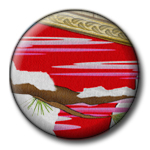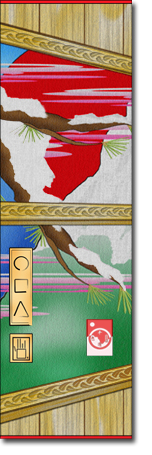On The Way: The Daily Zen Journal
Discourses of Master Po Shan – Part 1
Po Shan (1575-1630)
When working at Zen, the important thing is to generate the i ching (doubt sensation). What is this doubt sensation? For instance: Where did I come from before my birth, and where shall I go after my death?
Since one does not know the answer to either question, a strong feeling of “doubt” arises in the mind. Stick this “doubt-mass” on to your forehead and keep it there all the time until you can neither drive it away nor put it down, even if you want to. Then suddenly you will discover that the doubt-mass has been crushed, that you have broken it into pieces. The masters of old said:

“The greater the doubt, the greater the awakening;
The smaller the doubt, the smaller the awakening;
No doubt, no awakening”
When working at Zen, the worst thing is to become attached to quietness, because this will unknowingly cause you to be engrossed in dead stillness. Then you will develop an inordinate fondness for quietness and at the same time an aversion for activity of any kind.
Once those who have lived amidst the noise and restlessness of worldly affairs experience the joy of quietness, they become captivated by its honey sweet taste, craving it like an exhausted traveler who seeks a peaceful den in which to slumber. How can people with such an attitude retain their awareness?
When working at Zen, one does not see the sky when lifting, nor the earth when lowering, one’s head. A mountain is not a mountain, and water is not water. While walking or sitting one is not aware of doing so. Though among a hundred thousand people, no one is seen. Without and within the body and mind nothing exists but the burden of this doubt-sensation. This feeling can be described as “turning the whole world into a muddy vortex.”
A Zen yogi should resolutely vow that he will never stop working until this doubt-mass is broken up. This is a most crucial point.
What does this “turning the whole world into a muddy vortex” mean? It refers to the great Truth, which from the time of no-beginning has existed latent and idle—it has never been brought forth. Therefore a Zen yogi should bestir himself to make the heavens spin and the earth and its waters roll; he will benefit greatly from the rolling surges and the tossing waves.
When working at Zen, one should not worry about not being able to revive after death; what should worry you is whether you can die out from the state of life! If you can really wrap yourself up tightly in i ching, the realm of movement will be vanquished naturally without making any specific effort to vanquish it, and distracted thoughts will be purified spontaneously without effort to purify them.
In a wholly natural way one will feel the six senses become spacious and vacuous. When one reaches this state, one will awaken to a mere touch and respond to the slightest call. Why then should one worry about not being able to revive?

When working in Zen, one should concentrate on one koan only, and not try to understand or explain them at all. Even if one were able to do so, this would be merely intellectual understanding and not true revelation.
The Lotus Sutra says:
“This Dharma is not understood through thinking and intellection.”
The Total Enlightenment Sutra declares:
“To perceive the Realm of Enlightenment of the Tathagata with the thinking mind is like attempting to burn Mount Sumeru with the light of a firefly; never will one succeed.”
When working at Zen, one who works with absorption will feel as if they had lifted a thousand-pound load; and even if one wants to put it down, is unable to do so.
Po Shan (1575-1630)
Source – The Practice of Zen – Chang Chen-chi
Notes from the translator for this reading:
1. I ching is a very important Zen term meaning doubt-sensation or the feeling of doubt. The whole system of koan exercises is based upon the generation and then the break through of this “doubt-sensation.” “Doubt” as used here, is not doubt in the ordinary sense of the word; it is, rather, a special type of doubt- a doubt without content-or, more succinctly, the pure sensation of doubt.
Sometimes Zen Buddhists also use the term “doubt-mass” to denote that this sensation is like a great mass or load weighing upon one’s mind.
Though i ching in it original useage denotes the doubt brought about by koan exercise, Master Po Shan seems to have used it here in a much wider sense.
2.The six senses are the eyes, ears, nose, tongue, body, and mind.
3. Hua tou (the essence of the sentence) Although both koan and hua tou may be used to denote the “inquiry exercise of Zen,” the latter is original or more accurate. “Koan” implies the entire Zen story, including all the events, plus the main question at issue, and therefore is a general term, while “hua tou” is very specific. Hua tou denotes only the question, not the whole story, and in most cases only the gist, highlight, or essence, so to speak, of the question is implied. Hua tou also means before a word or thought and the ends or edges of a sentence.





Here we have a reading that encourages us to raise this doubt mass. This term alone causes one to wonder what is this “doubt” they are talking about. Even exploring “What is it?” as a starting point is not a bad place to begin. All too often we think we understand a concept, but upon delving deeper we see ours is a superficial understanding at best.
Classical koan practice consisted of a teacher giving a historical koan to a student to work on. While these encounters from the past represent powerful breakthroughs, they happened spontaneously, on the spot between a teacher capturing a moment to engender awakening. I have often wondered what someone else’s koan could possibly do for later generations. And yet it is a part of Rinzai Zen that is still presently practiced.
Even if you don’t have a teacher to give you a koan to “work on,” life and our own questioning provide very potent material that causes us to stop and wonder. It enters koan quality when there is no easy answer to your question and you sit with it for years and years. Because it is so personal, it can haunt you and return as your spiritual theme.
Just because there is no easy answer or quick solution, though, is no reason to abandon your efforts or to trivialize your question. Your own questions have the most power if you can allow them to stay close. For each of us, there is a burning question/ koan that is our own to lead us to enlightenment. Our biggest stumbling block is our tendency to fool ourselves and think we know more than we really do…we stop and congratulate ourselves too early in the process.
May our minds be clear!
Elana